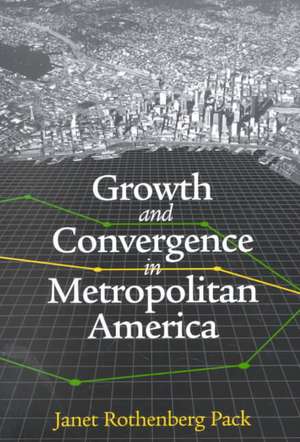Growth and Convergence in Metropolitan America: James A. Johnson Metro Series
Autor Janet Rothenberg Packen Limba Engleză Paperback – 2002
While the suburbs of most metropolitan areas are wealthier than their urban counterparts, rapid regional growth can improve the welfare of both city and suburb, according to a new book from Janet Rothenberg Pack. In Growth and Convergence in Metropolitan America, Pack identifies growth trends that have contributed to the convergence of welfare among regions. Pack analyzes demographic, social, and economic data from 277 metropolitan areas in the northeastern, midwestern, southern, and western United States between 1960 and 1990. Her analysis reveals a strong connection between regional growth and improved socioeconomic vitality. She finds little connection between population growth—the focus of many previous studies—and well-being, but a strong connection between per capita income growth and well-being. Moreover, there has been a major change in the factors associated with economic growth between the 1970s and 1980s. In the latter decade, the importance of an educated labor force and major universities have assumed major importance. This appears likely to have continued to be true in the 1990s. While current urban policy has focused on intra-metropolitan cooperation as the key to improving conditions in declining or slow-growing urban areas, Pack's analysis emphasizes the major differences among the larger regions of the country—both their cities and suburbs. From this perspective, national policies, both macro-economic policy and the progressive income tax, appear to be the most effective influences promoting regional convergence and improving the socio-economic well-being of both city and suburban residents.
Preț: 116.85 lei
Preț vechi: 157.46 lei
-26% Nou
Puncte Express: 175
Preț estimativ în valută:
22.36€ • 23.20$ • 18.69£
22.36€ • 23.20$ • 18.69£
Carte indisponibilă temporar
Doresc să fiu notificat când acest titlu va fi disponibil:
Se trimite...
Preluare comenzi: 021 569.72.76
Specificații
ISBN-13: 9780815702474
ISBN-10: 0815702477
Pagini: 208
Dimensiuni: 152 x 229 x 16 mm
Greutate: 0.36 kg
Ediția:New.
Editura: Brookings Institution Press
Colecția Brookings Institution Press
Seria James A. Johnson Metro Series
Locul publicării:United States
ISBN-10: 0815702477
Pagini: 208
Dimensiuni: 152 x 229 x 16 mm
Greutate: 0.36 kg
Ediția:New.
Editura: Brookings Institution Press
Colecția Brookings Institution Press
Seria James A. Johnson Metro Series
Locul publicării:United States
Notă biografică
Janet Rothenberg Pack is professor of business and public policy and real estate at the Wharton School, University of Pennsylvania.
Descriere
While the suburbs of most metropolitan areas are wealthier than their urban counterparts, rapid regional growth can improve the welfare of both city and suburb, according to a new book from Janet Rothenberg Pack. In Growth and Convergence in Metropolitan America, Pack identifies growth trends that have contributed to the convergence of welfare among regions. Pack analyzes demographic, social, and economic data from 277 metropolitan areas in the northeastern, midwestern, southern, and western United States between 1960 and 1990. Her analysis reveals a strong connection between regional growth and improved socioeconomic vitality. She finds little connection between population growth—the focus of many previous studies—and well-being, but a strong connection between per capita income growth and well-being. Moreover, there has been a major change in the factors associated with economic growth between the 1970s and 1980s. In the latter decade, the importance of an educated labor force and major universities have assumed major importance. This appears likely to have continued to be true in the 1990s. While current urban policy has focused on intra-metropolitan cooperation as the key to improving conditions in declining or slow-growing urban areas, Pack's analysis emphasizes the major differences among the larger regions of the country—both their cities and suburbs. From this perspective, national policies, both macro-economic policy and the progressive income tax, appear to be the most effective influences promoting regional convergence and improving the socio-economic well-being of both city and suburban residents.














